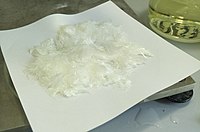
Biostimulation and microbial community profiling reveal insights on RDX transformation in groundwater
Sign Up to like & getrecommendations! Published in 2017 at "MicrobiologyOpen"
DOI: 10.1002/mbo3.423
Abstract: Hexahydro‐1,3,5‐trinitro‐1,3,5‐triazine (RDX) is a high explosive released to the environment as a result of weapons manufacturing and testing worldwide. At Los Alamos National Laboratory, the Technical Area (TA) 16 260 Outfall discharged high‐explosives‐bearing water from… read more here.
Keywords: groundwater; rdx degrading; rdx; biostimulation ... See more keywords

Diversity and abundance of the functional genes and bacteria associated with RDX degradation at a contaminated site pre- and post-biostimulation.
Sign Up to like & getrecommendations! Published in 2021 at "Applied microbiology and biotechnology"
DOI: 10.1007/s00253-021-11457-x
Abstract: Bioremediation is becoming an increasingly popular approach for the remediation of sites contaminated with the explosive hexahydro-1,3,5-trinitro-1,3,5-triazine (RDX). Multiple lines of evidence are often needed to assess the success of such approaches, with molecular studies… read more here.
Keywords: functional genes; associated rdx; pre post; abundance ... See more keywords

Coupling of biostimulation and bioaugmentation for enhanced bioremoval of chloroethylenes and BTEX from clayey soil
Sign Up to like & getrecommendations! Published in 2021 at "Ecotoxicology"
DOI: 10.1007/s10646-020-02323-z
Abstract: The bioremoval potential of Pseudomonas plecoglossicida toward mixed contaminants was explored through the coupled biostimulation and bioaugmentation in soil microcosm. Response surface methodology was employed to optimize nutrients and innoculum size for the cometabolic removal… read more here.
Keywords: cis dce; soil; biostimulation; biostimulation bioaugmentation ... See more keywords

Microbial community evolution during the aerobic biodegradation of petroleum hydrocarbons in marine sediment microcosms: Effect of biostimulation and seasonal variations.
Sign Up to like & getrecommendations! Published in 2020 at "Environmental pollution"
DOI: 10.1016/j.envpol.2020.114858
Abstract: Evolution of the microbial community structure in crude oil contaminated marine sediments was assessed under aerobic biodegradation during wet (18 °C) and dry (28 °C) seasons experiments, to account for seasonal variations in nutrients and temperature, under… read more here.
Keywords: aerobic biodegradation; microbial community; community; seasonal variations ... See more keywords

Coupling biostimulation and phytoremediation for the restoration of petroleum hydrocarbon-contaminated soil
Sign Up to like & getrecommendations! Published in 2022 at "International Journal of Phytoremediation"
DOI: 10.1080/15226514.2022.2103511
Abstract: Abstract Total petroleum hydrocarbons (TPH) continue to be among the most common pollutants in soil worldwide. Bioremediation and phytoremediation have become sustainable ways of dealing with TPH contamination and biostimulation-assisted phytoremediation is considered as a… read more here.
Keywords: biostimulation; phytoremediation; rate; petroleum ... See more keywords

Combining topical dermal infused exosomes with injected calcium hydroxylapatite for enhanced tissue biostimulation
Sign Up to like & getrecommendations! Published in 2023 at "Journal of Cosmetic Dermatology"
DOI: 10.1111/jocd.15695
Abstract: Exosome research continues to flourish. Subsequent knowledge surrounding indications, dose–response, safety, efficacy, and the ability to combine exosome treatment as a “skin primer”—for biostimulation modalities such as calcium hydroxylapatite (CaHA), platelet‐rich plasma (PRP), and platelet‐rich… read more here.
Keywords: dermal infused; combining topical; biostimulation; topical dermal ... See more keywords

Evaluation of Biostimulation Efficacy on the Reinforcement of Calcareous Sand
Sign Up to like & getrecommendations! Published in 2021 at "Journal of Testing and Evaluation"
DOI: 10.1520/jte20200495
Abstract: Calcareous sand is widely distributed on the continental shelf and along the coast and has a low mechanical strength and a high compressibility. The use of biostimulation to activate and enrich ureolytic bacteria induces mineralization… read more here.
Keywords: biostimulation; evaluation; ureolytic bacteria; calcareous sand ... See more keywords

Biostimulation of jarosite and iron oxide-bearing mine waste enhances subsequent metal recovery.
Sign Up to like & getrecommendations! Published in 2022 at "Journal of hazardous materials"
DOI: 10.2139/ssrn.4229663
Abstract: Novel resource recovery technologies are required for metals-bearing hazardous wastes in order to achieve circular economy outcomes and industrial symbiosis. Iron oxide and co-occurring hydroxysulphate-bearing wastes are globally abundant and often contain other elements of… read more here.
Keywords: waste; biostimulation; iron; bearing mine ... See more keywords

Effect of Biostimulation on Estrus Expression, Resumption of Ovarian Activity and Conception Rate in Postpartum Anestrus Nili-Ravi Buffaloes during Low Breeding Season
Sign Up to like & getrecommendations! Published in 2018 at "Pakistan Veterinary Journal"
DOI: 10.29261/pakvetj/2018.007
Abstract: Received: Revised: Accepted: Published online: May 31, 2017 September 18, 2017 September 22, 2017 November 21, 2017 This study evaluated the effect of biostimulation by bull exposure on estrus expression, resumption of ovarian activity, and… read more here.
Keywords: breeding season; low breeding; expression; ovarian activity ... See more keywords

Biostimulation of Petroleum-Contaminated Soil Using Organic and Inorganic Amendments
Sign Up to like & getrecommendations! Published in 2023 at "Plants"
DOI: 10.3390/plants12030431
Abstract: The most common approaches for the in-situ bioremediation of contaminated sites worldwide are bioaugmentation and biostimulation. Biostimulation has often proved more effective for chronically contaminated sites. This study examined the effectiveness of optimized water hyacinth… read more here.
Keywords: water hyacinth; biostimulation; inorganic amendments; organic inorganic ... See more keywords